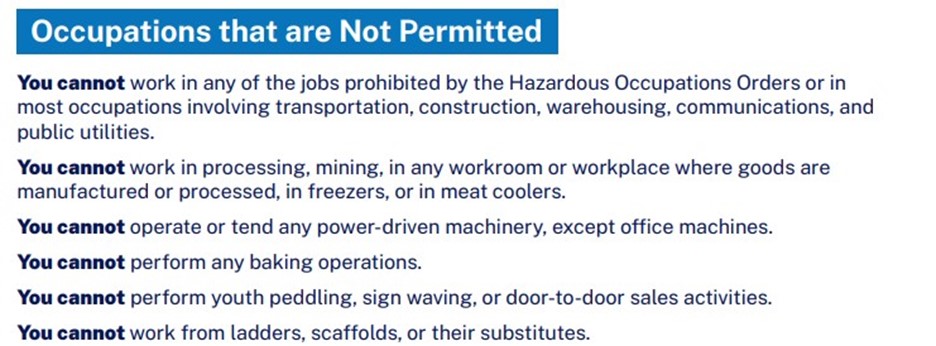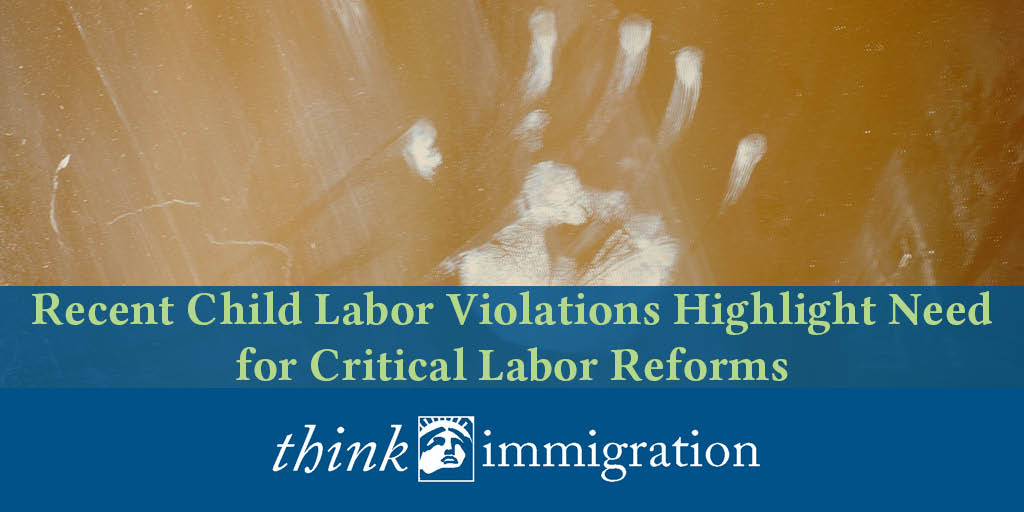On July 14, 2023, Devan Tomas Perez, a 16 year old boy from Guatemala, was killed whereas working an evening time sanitation shift at Marjac, a poultry processing facility in Hattiesburg, Mississippi. Devan’s demise comes after the death of two other 16 year old boys working hazardous jobs this summer time in the USA. On June twenty ninth, Michael Schuls died whereas working at a Wisconsin sawmill and, on June eighth, Will Hampton died from accidents sustained working at a landfill. These three deaths occurred on the heels of huge investigative reporting efforts over the past a number of months from NBC, the New York Times, and 60 Minutes about youngsters throughout the U.S. working in industries, like protein processing, with excessive charges of accidents, sicknesses, and fatalities .
Many of those tales targeted on the immigration and familial standing of those youngsters, specifically that they’re unaccompanied minors from Central and South America, shifting the blame away from employers. As a substitute, mother and father have been arrested and put into removing proceedings, and younger adults who misrepresented their age to press and border officers have been met with vindictive hit pieces. Important collateral penalties might ensue of their immigration circumstances, ruining not solely their lives however these of different youngsters and younger adults fleeing poverty and violence.
However Schuls and Hampton have been white, U.S. Citizen youngsters. Their deaths illustrate that youngster labor violations are rampant and have an effect on not solely immigrant, indigenous, Black, and brown communities. Thus, the latest media consideration on youngster labor highlights the necessity for reform of each U.S. immigration legal guidelines and federal youngster labor legal guidelines. It seems like not a lot has modified because the industrial revolution, when labor activists like Mother Jones have been first sounding the alarm across the exploitation of kids’s labor.
Baby Labor Legislation
The historical past of labor reforms in the USA on the flip of the twentieth century was deeply linked to youngster labor exploitation. Throughout this time, youngster labor was commonplace, and youngsters usually labored lengthy shifts in extremely harmful circumstances. Perhaps the most famous child workers were the breaker boys: young boys who worked in mines and separated coal from slate and impurities by hand. Youngsters additionally labored in factories, as chimney sweeps, and as home servants.
Among the nation’s earliest labor legal guidelines have been targeted on regulating youngster labor, particularly in hazardous industries. In 1842, Massachusetts passed the nation’s first ever child labor law, prohibiting children under 12 years from working in factories. By 1850, each state in New England had adopted Massachusetts’ instance setting minimal authorized working ages for youngsters, various from 9 to 14. In 1916, the Keating-Owen Act–the primary federal legislation regulating youngster labor–handed. Nevertheless, this legislation solely regulated youngster labor utilized in sure companies (factories, workshops, canneries, mines, and quarries) together with companies that participated in interstate commerce. This meant that just about 2 million extra youngster employees in different kinds of companies, most notably home-based companies and farms, weren’t coated by the legislation. Far fewer than 10% of kids have been truly coated. The Keating-Owens Act was struck down by the Supreme Court docket two years later, and it was not till the passing of the Truthful Labor Requirements Act (FLSA) in 1938 {that a} federal youngster labor legislation can be upheld by the courtroom. Whereas the FLSA was an enormous step ahead in labor reform, establishing federal minimal wage and time beyond regulation necessities amongst different issues, the delineation of what work is and isn’t permissible for youngsters stays complicated and unclear.
Below the FLSA, there are two classes for youngster labor: agricultural and non-agricultural. For agricultural jobs, youngsters as younger as 10 are permitted to work if employers submit a request to the Secretary of Labor. Youngsters below 12 may work in agriculture with the consent of their father or mother or guardian, with no minimal wage requirement in place. Outdoors of agricultural jobs, the FLSA units a minimal working age of 16 years previous. Nevertheless, the corresponding rules to the FLSA enable for youngsters as younger as 14 to work in 15 classes of occupations starting from workplace and clerical work to lifeguarding (however solely if you’re 15) to cooking, as long as the cooking doesn’t happen over an open flame. The checklist goes on.
Thus, when making an attempt to find out what jobs 14- and 15-year-olds can legally work, you might be confronted with a convoluted and unclear collection of guidelines.
The U.S. Division of Labor offers a “Young Worker Toolkit” however these supplies are simply as complicated because the legal guidelines. For instance, a bookmark from the Young Worker Toolkit makes an attempt to supply a succinct rationalization of what non-agricultural jobs 14 and 15 yr previous youngsters can carry out stating: “work in particular non-hazardous jobs in non-manufacturing industries below sure circumstances.” To establish what these “non-hazardous jobs in non-manufacturing industries” are, youngsters and their households can look to the DOL’s Youth Employment Guide, which states:

This language is hardly accessible for 14- and 15-yearolds, not to mention unaccompanied minors and people with restricted literacy, even when translated to Spanish and different languages.
Recourse for Baby Labor Violations
Whereas the three 16-year-olds who tragically misplaced their lives this summer time have been prohibited from doing the particular kinds of jobs they have been doing, they have been not prohibited from working in these hazardous industries. On this sense, the DOL steering might be deceptive; whereas DOL’s Youth Employment information implies that 16-year-olds like Devan are usually not allowed to work within the meat processing business, when trying on the rules, there isn’t any clear prohibition of people below 18. Reasonably, there are 7 classes of jobs youngsters ages 16 and 17 are prohibited from doing in meat processing amenities, together with the job Devan was doing on the evening of his demise: cleansing gear. As a substitute of itemizing out exceptions, youngster labor rules ought to flat out prohibit youngsters below 18 from working in these industries. Till then, youngsters, households, and employers will stay confused about what jobs these youngsters can and can’t do, and in flip, our nation’s youngsters, no matter standing, will proceed to get injured and killed.
Fortunately, there’s some recourse for youngster labor violations. These violations might be reported to the Wage and Hour Division, which may then assess again wages owed to minors and civil cash penalties in opposition to corporations violating youngster labor legal guidelines. For immigrant employees and youngsters, there are some restricted immigration protections out there as nicely. Labor companies can present U-visa certifications for victims of sure crimes that happen within the office as long as there’s an underlying legislation that the company enforces that was additionally violated and the employee cooperates within the investigation. Moreover, employees, together with youngsters, who’re victims of trafficking might be able to get hold of a T-visa with the labor companies offering a T-visa certification. Moreover, in January 2023, the Department of Homeland Security announced a streamlined course of for immigrant employees to acquire labor-based deferred motion, a brief standing for immigrant employees concerned in an area, state, or federal labor investigation or dispute. Deferred motion protects immigrant employees from retaliation within the type of immigration enforcement and offers them with a piece allow, thereby enabling them to benefit from the full vary of whistleblower protections together with reinstatement right into a job, backpay, and ahead pay. Immigration practitioners who come into contact with immigrant employees and youngsters ought to display for these types of reduction.
Intertwined Labor and Immigration Actions
The FLSA is now 85 years previous. On the time of its passing, members of Congress from the Jim Crow South, ensured that jobs the place Black, brown, and immigrant employees have been concentrated have been exempt from its protections. To this present day, farmworkers are exempt from time beyond regulation necessities. The kid labor exceptions have resulted in poor youngsters, immigrant youngsters, and youngsters of coloration being exploited in these industries as nicely. Thus, labor advocates pushing for adjustments to the FLSA, together with eradicating time beyond regulation exemptions, should additionally push for these essential youngster labor reforms. And immigrant advocates pushing for adjustments in our nation’s immigration legal guidelines, significantly for unaccompanied minors, ought to be part of within the labor combat as nicely.

